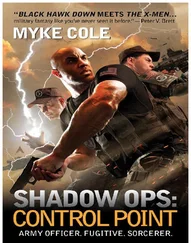Mack Maloney - Chopper Ops
Здесь есть возможность читать онлайн «Mack Maloney - Chopper Ops» весь текст электронной книги совершенно бесплатно (целиком полную версию без сокращений). В некоторых случаях можно слушать аудио, скачать через торрент в формате fb2 и присутствует краткое содержание. Город: Naples, FL, Год выпуска: 2011, ISBN: 2011, Издательство: Berkley, Жанр: Боевик, на английском языке. Описание произведения, (предисловие) а так же отзывы посетителей доступны на портале библиотеки ЛибКат.
- Название:Chopper Ops
- Автор:
- Издательство:Berkley
- Жанр:
- Год:2011
- Город:Naples, FL
- ISBN:978-1-61232-148-6
- Рейтинг книги:3 / 5. Голосов: 1
-
Избранное:Добавить в избранное
- Отзывы:
-
Ваша оценка:
- 60
- 1
- 2
- 3
- 4
- 5
Chopper Ops: краткое содержание, описание и аннотация
Предлагаем к чтению аннотацию, описание, краткое содержание или предисловие (зависит от того, что написал сам автор книги «Chopper Ops»). Если вы не нашли необходимую информацию о книге — напишите в комментариях, мы постараемся отыскать её.
Chopper Ops — читать онлайн бесплатно полную книгу (весь текст) целиком
Ниже представлен текст книги, разбитый по страницам. Система сохранения места последней прочитанной страницы, позволяет с удобством читать онлайн бесплатно книгу «Chopper Ops», без необходимости каждый раз заново искать на чём Вы остановились. Поставьте закладку, и сможете в любой момент перейти на страницу, на которой закончили чтение.
Интервал:
Закладка:
A dozen smaller buildings were scattered around the palace compound itself, which in turn was surrounded by another heavily guarded wall. One building housed a vast collection of rare automobiles. Deusenbergs, Bugattis, Mercers, a half-dozen Lamborghinis, several special-order Jaguars—there were thirty-five of them in all, this despite the fact that only one road led in and out of the palace and it was poorly paved at best.
Another building contained an immense art collection. Rembrandts, Reubens, Titians, Monets, Renoirs. Some sculptures. Some modern pieces. All of the artwork was priceless. Most of it was stolen.
The second-largest structure in the compound was a six-story, twenty-two-room affair located near the outer southern wall. It resembled a five-star hotel, which in some respects it was. It featured great views of the snowcapped Rabat Mountains to the east or the equally pleasing Divila River to the west. Some of the most notorious figures of the last half of the 20th century had come to this place to drop out of sight. Carlos the Jackal had stayed here. So had Idi Amin, Abou Abbas, Carl Letiner of the Cali Cartel, and various members of Hamas, the IRA, and the Red Brigades. Lesser-known art forgers, jewel thieves, wealthy billionaires who’d faked their deaths, and high-up government officials who’d felt the need to disappear—many of them had also spent time as guests in the “Hotel.”
It was said that exactly one half of the Qom-el-Zarz palace sat in Iraq, and the other half in Iran. There was no real proof of this; the border here was hazy at best. But if true, neither Iran or Iraq ever tried to lay claim to the place. This was out of respect for—and fear of—the person who lived here.
His name was Azu-mulla el-Zim, more simply known as “Zim.” He was an odd, mysterious figure, weighing nearly four hundred pounds, with a scraggly beard and Coke-bottle-thick eyeglasses. He was a modern-day sultan of sorts, rich beyond dreams. He had no friends, but no enemies either, as they said in the Middle East. And he was a true paradox. He was a sadist, ruthless in many ways, but also a connoisseur of great art. He was responsible for the deaths of countless innocents over the years, yet tears never failed to come to his eyes when listening to a Wagner opera. His stolen art collection was among the largest in the world, yet he’d made many substantial if secret contributions to the Louvre Fund over the years.
Zim began life as a smuggler at the age of ten, swallowing packets of opium for Syrian drug dealers and then walking across the border into Lebanon to sell them on the other side. As he grew older, he went into dealing arms, heroin, and much later, black-market computer chips. He’d amassed a great fortune simply by eliminating anyone he saw as a competitor. He’d murdered dozens of people himself, and had paid to have hundreds more killed. He read The Wall Street Journal , the Financial Times of London , and at least a dozen other financial sheets cover-to-cover every day, and held huge interests in every large world market. Yet very few people in the West knew he even existed.
His wealth was estimated at several billion. But with Zim, it was not really about money. It was about control, power, and the love of playing two sides against one another. He was ruthless, a misogynist, a charming liar. He lived a fabulous life. He owned many things. He owned many people.
He also owned the AC-130 ArcLight gunship.
Just how Zim had come to possess the special operations plane was a deep mystery to those who knew him.
Some believed Zim had “willed” the airplane to land near his compound the night it disappeared. Others claimed he had somehow interfered with the plane’s navigational system and forced it down that way. Still others said he’d managed to get into the dreams of the pilots flying the plane and had introduced a hypnotic suggestion forcing them to land that night. Another tale said he’d secretly paid off the crew weeks before, and that they came willingly.
But however he’d come to own it, he considered it more than just another weapon or another piece of art.
In many ways, it was his most prized possession.
On this day, Zim was sitting in his main chamber, perched upon exactly one hundred large silk pillows, reading the latest edition of Le Monde .
He was of indeterminate age; though he looked to be in his mid-fifties, it was thought he was at least twenty years older. His usual attire was a simple silk gown, sandals, and a kufi. His beard was somewhat gray, his skin tanned on his face and hands, but nowhere else. When he spoke English, he did so with a pronounced lisp.
He was surrounded, as always, by a dozen girls, most of them from Japan, most of them barely in their teens. A pot of calming tea was steaming on a table nearby. The remains of some small biscuits littered the tea tray. The room was filled with the stench of plum incense. A bank of computer screens glowed at one end of the room. They were filled with the latest financial information from Zurich, Paris, London, New York.
Zim clapped his hands, and one of the young Japanese girls crawled up the hill of pillows and knelt before him. He raised his right eyebrow a bit—the girl knew what this meant right away. She reached up, took off his thick-rimmed glasses, wiped a speck of dust from the right lens, and returned them to Zim’s nose. Then she slipped back down to the floor.
Zim was reading a piece on the fluctuating uranium market, and was thinking about organizing a coup in the Ivory Coast that would bring him closer to the uranium fields at Daloa, when the door at the far end of his chamber opened.
Two heavily armed men stepped in. Dressed all in black, they bowed and made way for a third person. This man came in on his knees, inching forward a little bit at a time. He was one of Zim’s legion of flunkies, glorified servants who ran errands and carried messages for him from the various parts of his palace. They were all required to enter into his presence this way.
The man had made it about fifteen feet inside the room when Zim finally shouted at him: “OK, get up, you ass!”
The man immediately obeyed and began tiptoeing across the room toward the mountain of pillows. The Japanese girls made way for him as, with trembling hand, he proffered a note on a silver tray up to Zim.
On a signal from Zim, one girl took the note, climbed up the pillows, and presented it to him with a long deep bow.
Zim put his magazine aside, adjusted his thick glasses, and opened the note.
A hush came over the room. This was not considered pleasant news, and the man who had delivered it was in desperate fear of his life at the moment. It was not unknown for Zim to kill the messenger when the news was bad.
Zim read the note silently. He seemed confused at first—again not a good sign.
“Who sent this?” he asked.
The man at the base of the pillows quavered a bit.
“Your guest in Room Six,” he replied with a shaky voice. “He’s been on the phone all night.”
Zim considered this, then reread the note.
“Is he being intentionally vague?” he asked the messenger.
“I have no idea, sir,” the man replied, his voice equal parts terror and confusion. “Shall I go back and ask him?”
Zim shook his head. “No, I think I know what he means.”
He crumpled the note and threw it down on the mountain of pillows. Then he put his hand to his chin in thought.
“Tell Major Qank to activate the Third Ring,” he told the messenger. “He is to report to me anything unusual that those in the Ring might see. Understand?”
“I do,” the man replied, backing up slowly. If he could just get out of the door alive, it would be a major victory.
Читать дальшеИнтервал:
Закладка:
Похожие книги на «Chopper Ops»
Представляем Вашему вниманию похожие книги на «Chopper Ops» списком для выбора. Мы отобрали схожую по названию и смыслу литературу в надежде предоставить читателям больше вариантов отыскать новые, интересные, ещё непрочитанные произведения.
Обсуждение, отзывы о книге «Chopper Ops» и просто собственные мнения читателей. Оставьте ваши комментарии, напишите, что Вы думаете о произведении, его смысле или главных героях. Укажите что конкретно понравилось, а что нет, и почему Вы так считаете.












